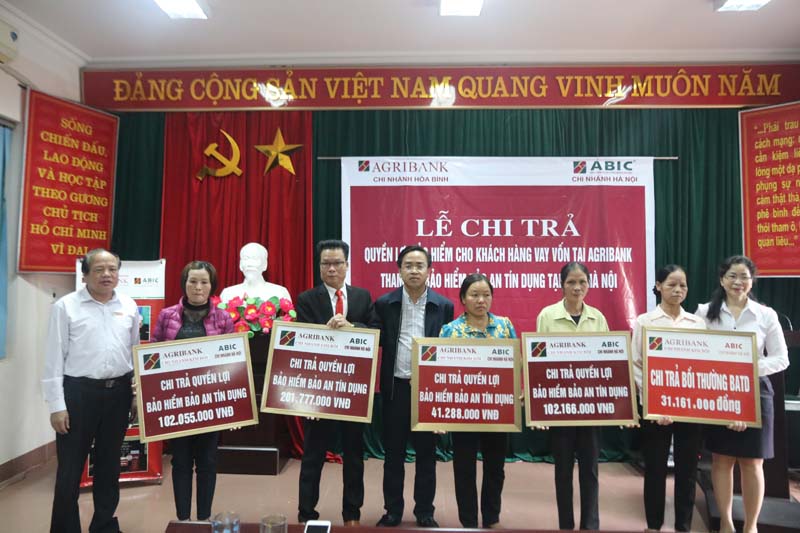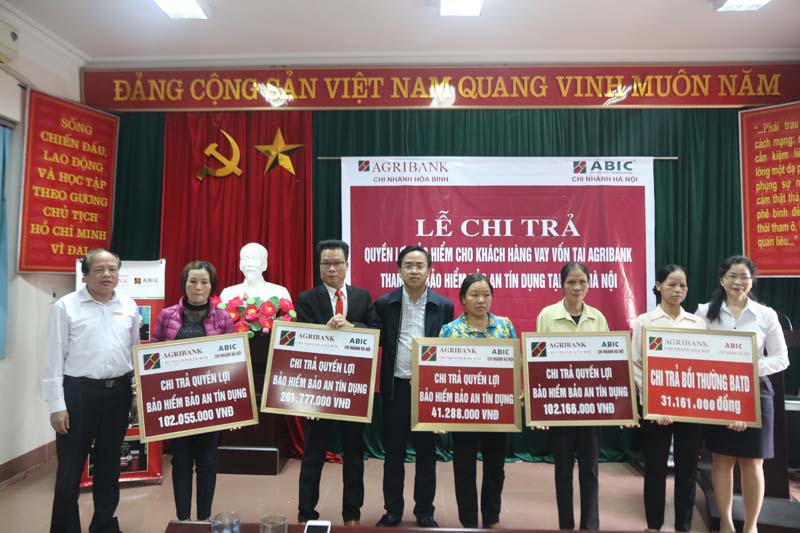
(HBO) – The Hanoi branch of the Agriculture Bank Insurance joint Stock Corporation (ABIC) has paid bancassurance compensations to the families of five dead clients of the Vietnam Bank for Agriculture and Rural Development (Agribank)’s branch in Kim Boi district. The customers joined ABIC credit insurance while borrowing loans from the Agribank. ABIC Hanoi and representatives of the borrowers’ families paid all the loans to Agribank Kim Boi.

Representatives from ABIC Hanoi, Agribank
Hoa Binh and Agribank Kim Boi paid compensations equivalent to 100 percent of
the loans to families of the dead clients.
The total bancassurance compensations that ABIC paid to the five families
were nearly 488 million VND (19,264 USD). Specifically, Bui Van Thieu’s family
in Nam Thuong commune received over 31 million VND; Bui Van Huynh’s in Vinh
Dong commune got over 41.2 million VN; Dinh Cong Tho’s in My Hoa commune was
paid 102 million VND; Bui Van Kien’s in Cuoi Ha commune got nearly 103 million
VND; and Tran Van Canh’s in Bo town received nearly 202 million VND.
According to a representative of the ABIC Hanoi, with
the deepest sympathies to the families of the dead clients of Agribank Kim Boi,
ABIC Hanoi paid 100 percent of the loans the customers borrowed from the bank.
ABIC Hanoi hopes to ease the difficulties and great loss that the families
face, helping them to stabilise and rise in economic development, said the
representative.
Since the credit insurance "Bao An Tin Dung” product
was launched in Kim Boi, the ABIC Hanoi has paid compensations totaling 2.8
billion VND to 125 customers.
In 2018, ABIC Hanoi compensated 22 families of clients
with 820 million VND. Currently, Agribank Kim Boi annually serves about 4,800
borrowers who also joined Bao An Tin Dung insurance provided by ABIC Hanoi.
The emulation movement "Hoa Binh joining hands to build new-style rural areas” has been widely spreading, becoming a driving force that motivates the localities to renew rural landscapes and improve the material and spiritual lives of the residents. In this movement, the people play a central role-both as the main implementers and direct beneficiaries of its outcomes.
In response to the global digital revolution, Hoa Binh Newspaper is transforming itself into a modern and multi-platform media hub, blending cutting-edge technology with a restructured newsroom and a new generation of tech-savvy journalists.
Hoa Binh province’s Association of the Elderly recently held a conference to review the project on expanding the inter-generation self-help club model until 2025.
In a move to implement Resolution No. 57-NQ/TW, issued on December 22, 2024 by the Politburo, which targets breakthroughs in science-technology development, innovation, and digital transformation, the Hoa Binh provincial Department of Health has issued a plan to roll out the "Digital Literacy for All” campaign within the local health sector.
An Nghia Commune (Lạc Sơn District) is one of the communes that achieved the tha standard of the national new rural area in 2018. Entering a new development phase, the commune is now trying to meet the criteria for the advanced new rural development. With the strong political will and the public consensus, the commune is gradually overcoming the challenges to reach this goal, aiming for the sustainable development.



